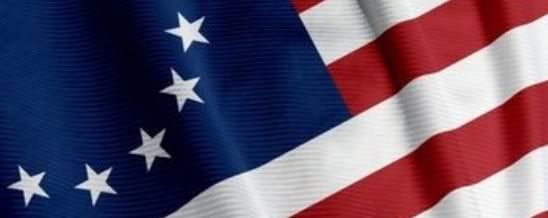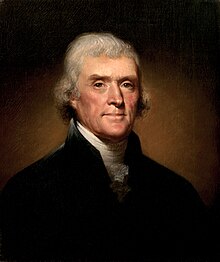Today is Independence Day in the United States of America ... and it's something that we in Wales should be celebrating every bit as much as our relatives across the pond.

Of those who signed the Declaration of Independence back in 1776, sixteen were of Welsh descent, namely:
George Clymer, Stephen Hopkins, Robert Morris, William Floyd, Francis Hopkinson, Francis Lewis, John Morton, Britton Gwinnett, Thomas Jefferson, John Penn, George Read, John Hewes, James Smith, Williams Hooper, Lewis Morris and William Williams.
Foremost among them was Thomas Jefferson, who was the principal author of the document itself and eventually became third President. He said of himself:
The tradition in my father's family was, that their ancestor came to this country from Wales, and from near the mountain of Snowdon, the highest in Great Britain.
We can only assume that he thought the higher mountains in Scotland were part of not-so-great Britain. The other famous surname is that of John Penn, who was related to William Penn, the man who founded the colony he first called New Wales, but which later became Pennsylvania.
But perhaps more influential than anyone who signed the document was Richard Price, a non-conformist minister from Glamorgan. This is what David Williams said about his contribution:
One Welshman, however, although he never set foot on the American continent, did contribute vitally to America's political development. This was the philosopher, Dr Richard Price. Price's contribution was twofold. In the first place, he may be said to have changed the nature of the Revolution itself. For, to begin with, the Revolution was a conservative one; its purpose was to preserve a system of government against reactionary innovation on the part of George III and his ministers, and it was to the common law rights of Englishmen, and to English constitutional precedents, that the colonists appealed for a redress to their grievances. But early in 1776 there appeared Richard Price's Nature of Civil Liberty, of which 60,000 copies were immediately sold, and of which no fewer than fifteen editions were called for within one year. In this Price advised the colonists to act according to 'the principles of liberty', and not according to 'the practice of former times'; to appeal, not to the legal rights of Englishmen, but to the natural rights of men, and thereby the whole temper of the Revolution was changed.
Moreover, Price, in his various writings, drew a glowing picture of the future of America, and this faith in the future destiny of their country has had a great influence in welding together the diverse elements which form the American population into one nationality. In older countries the sentiment of nationality derives mainly from a common background; the essence of national consciousness is a common tradition. But this is lacking in a population made up largely of immigrants, and the part played in other countries by a common tradition has been played in America by a common faith in the future. This America owes as much as anyone to Dr Richard Price. It is no wonder that the new government invited him to emigrate, and that Yale bestowed an honorary doctorate on him, the only other recipient of the honour at the same time being George Washington himself.
David Williams, National Library of Wales Journal, Summer 1942, Vol II/3 & 4
If you want to read the pamphlet, it's available online as a facsimile or as a more readable text version here.
-
It's interesting to wonder to what extent there is anything distinctively Welsh about the ideas that led to American Independence ... for there were a good many Americans of English descent who wanted independence too, though in nowhere near the same proportion relative to the size of England compared with Wales.
While talking with a friend a couple of weeks ago, I was told that in the crisis that followed the American Declaration of Independence, Parliament in Westminster held a debate in which Welsh MPs were excluded on the grounds that American Independence was perceived as a specifically Welsh conspiracy to undermine the crown. He thought that it had been mentioned in a book by Bill Bryson. I've tried looking for some references, but haven't been able to find any. So can anyone shed some light on this? If it's true, as my friend said, the story would make some movie.
-
But despite what Parliament may or may not have thought about the Welsh, the important thing is that America did manage to retain its independence, despite the United Kingdom's attempt to quash it by force. Sadly, force became an all too familiar pattern for the rest of the Empire until the UK finally learned the lesson that it was better to let countries leave without killing those who dared to ask for independence.
-
More newly independent countries have produced—or been given—more modern constitutions, but America still stands out as a country that was founded on the highest of principles. And even if it hasn't quite lived up to those founding principles as it developed to become a superpower, the values of its founders are deeply embedded in its people, and the world is a better place because of it.
So Happy Birthday, America. When we come to draft our own Declaration of Independence for Wales, we can draw plenty of inspiration from the one we prepared earlier.





9 comments:
Couldn't have put it any better myself!
I hope any of our American friends that do visit/read this have a happy July 4th.
The famous portrait of Dr Richard Price (above) by the Benjamin West (the father or American painting http://stwnsh.com/benwest ) is on display outside the Council Chamber of the National Library of Wales.
Siôn Jobbins
NLW
As far as I know, no one has been able to locate Jefferson's Welsh family!
I thought that Thomas Jeffersons family came from Pembrokeshire???
And isnt Richard Price also seen as one of the architects of the French revolution??
Penddu
As far I know the only reference to Jefferson's Welsh ancestry was made by himself in his memoirs. And he said Snowdon.
Maybe BBC Wales could produce a program called "In search of Thomas Jefferson" would make a good investigation, and raise Wales profile.
Thanks Siôn, What I've shown is only an extract of the picture. You must see it every day, but I can't find a link to it on the LlGC site. There's one on this page. Do you know of a colour version?
MAC, as you say, the only evidence is what he himself said, which I quoted. I don't offer it as anything more than that. I certainly don't want to make any claim that Jefferson "was Welsh" ... only that he said his father's family were from Wales. Is it necessary to find a long lost cousin, fourteen times removed, living in Llanberis? And if that aspect of his parentage is less well attested (to the point that nobody can verify it ... and the Americans are certainly into that sort of thing, especially where a national icon is concerned) doesn't it make it all the more remarkable that he should draw attention to it, rather than to the links that are better attested?
For me, the much more interesting story is whether there's any truth in Welsh MPs being excluded from a debate in Parliament because of it being seen as a Welsh plot. That's what I'd most appreciate some information about.
Pen, I'm not at all sure about Pembrokeshire. But Dr Price definitely had an influence on the French Revolution too. I know your French is good, perhaps there's room for a piece on the Welsh influence on the French Revolution for the 14th?
I'm completely disillusioned and often repulsed by the way the United States government has acted as a modern superpower.
However, there is no denying the glory of their revolution against British colonialism and the virtue of their founding values, Tom Paine in particular has always stood out to me as a great influence.
The American people's capacity for radicalism and progressive causes can also not be under-stated. Despite the generally right-wing nature of their governments due to the flawed democracy they operate, America has had some incredible union struggles and revolutionary movements.
I was told a story in a pub in Pembrokeshire - in the village of Jefferston - that Thomas Jefferson was descended from a local farmer with a very unoriginal name (Thomas Thomas I think) and who was known locally as Thomas Jefferston - and registered under the name whan he emigrated to America. I dont know if dropping the t was deliberate or not.
I dont know if there is any truth in the story, but I liked it.
Penddu
Still searching for my elusive reference, I came across a lecture by Sir David Williams on the Cymmrodorion site. This is an interesting snippet, and might explain why Jefferson played up his Welsh connexions and played down his Scottish ones:
It may be a surprise to many that the American War of Independence, in a historian’s words, ‘developed a political awareness in Wales’ and ‘crystallised the attitude of the dissenters towards politics’ (51). Closely associated with the new radicalism were writers such as Richard Price, author of Observations on the Nature of Civil Liberty (52) in 1776 and David Williams, author in 1782 of Letters on Political Liberty (53).
There was overt Welsh support for John Wilkes in London, and Wales, like East Anglia, was unhappy about the war being waged against the American colonists. By contrast Scotland, perhaps seeking to demonstrate their political reliability after the events of 1715 and 1745, strongly supported ‘armed coercion of the American colonists’. A Wilkite journalist had argued even in 1769 that ‘the Welsh and the Scotch, who inhabit the remote ends of this kingdom, are very opposite in their principles. The former are hot, generous and great lovers of liberty. The latter violent and tyrannical’. (54)
51 David Williams, A History of Modern Wales (1950) at 168-69.
52 See Roland Thomas, Richard Price. Philosopher and Apostle of Liberty (1924).
53 See Whitney R. D. Jones, David Williams: the Anvil & The Hammer (1986).
54 See Linda Colley, Britons. Forging the Nation 1707-1837 (1992), Pimlico ed. 1994, note 20, at 138-141.
"Hot, generous and great lovers of liberty" certainly panders to my sense of vanity ... just don't tell our friends in the SNP about the other bit!
Post a Comment